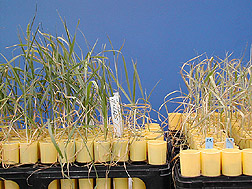in plants. the tendency to withstand or to not develop certain pest problems.
This article needs additional citations for verification. (August 2018) |
Plant breeding is the science of changing the traits of plants in order to produce desired characteristics. It has been used to improve the quality of nutrition in products for humans and animals. The goals of plant breeding are to produce crop varieties that boast unique and superior traits for a variety of applications. The most frequently addressed agricultural traits are those related to biotic and abiotic stress tolerance, grain or biomass yield, end-use quality characteristics such as taste or the concentrations of specific biological molecules (proteins, sugars, lipids, vitamins, fibers) and ease of processing (harvesting, milling, baking, malting, blending, etc.).
Plant breeding can be performed through many different techniques ranging from simply selecting plants with desirable characteristics for propagation, to methods that make use of knowledge of genetics and chromosomes, to more complex molecular techniques. Genes in a plant are what determine what type of qualitative or quantitative traits it will have. Plant breeders strive to create a specific outcome of plants and potentially new plant varieties, and in the course of doing so, narrow down the genetic diversity of that variety to a specific few biotypes.
It is practiced worldwide by individuals such as gardeners and farmers, and by professional plant breeders employed by organizations such as government institutions, universities, crop-specific industry associations or research centers. International development agencies believe that breeding new crops is important for ensuring food security by developing new varieties that are higher yielding, disease resistant, drought tolerant or regionally adapted to different environments and growing conditions.
A recent study shows that without plant breeding, Europe would have produced 20% fewer arable crops over the last 20 years, consuming an additional 21.6 million hectares of land and emitting 4 billion tonnes of carbon. Wheat species created for Morocco are currently being crossed with plants to create new varieties for northern France. Soy beans, which were previously grown predominantly in the south of France, are now grown in southern Germany.

